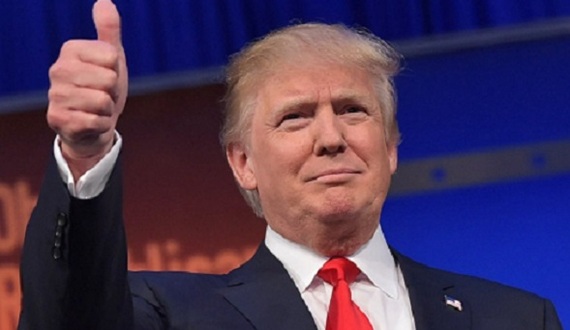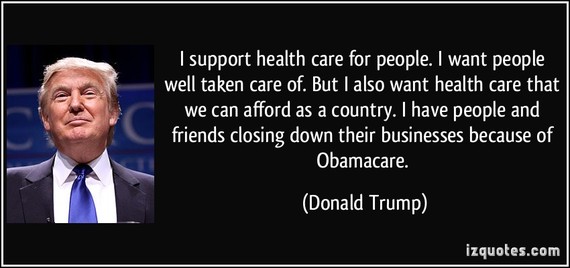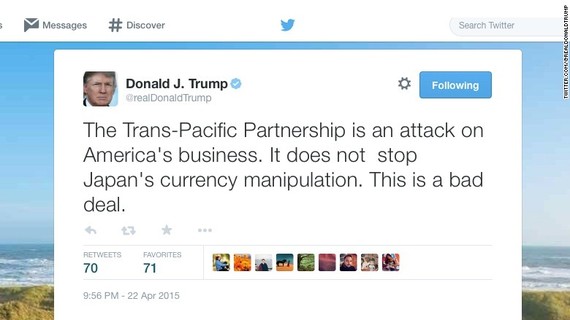Credit
There are 20 to 30 million small businesses in America. In some estimates, up to 70 percent of small businesses are owned and operated by a single person (the entrepreneur). These small businesses employ 77 million Americans and account for 60 - 80 percent of all new jobs created.
In other words, small businesses are vital to America's economic health. That is why it is incredibly important that the nation's commander-in-chief understand how to foster their growth and make them competitive in the global marketplace.
No one knows as yet who will be elected later this year, but in an effort to better understand how one candidate's policy proposals might affect the small business sector, I spoke with New York native, commercial financier, Kris Roglieri about his thoughts on one of the most controversial candidates in U.S. history.
Roglieri is no stranger to politics or finance and is a wildly successful entrepreneur himself. "There are so many issues squeezing small businesses - taxes, healthcare, the economy - that I think it's important to evaluate how they each would affect our livelihood as business owners," says Roglieri, the owner of several finance companies and Commercial Training Group, a program that teaches and enables entrepreneurs to own and operate their own full service commercial finance companies.
I wanted to hear his take on how small businesses would be affected by a Donald Trump Presidency, so we discussed and tackled the salient issues.
Taxes
"One of the biggest factors in Trump's appeal to entrepreneurs is that he has experienced entrepreneurship and can empathize with challenges business owners face," says Roglieri. Trump opposes corporate tax inversions and outlines a simple tax plan with 15 percent corporate taxes.
"I find his tax plan extremely appealing considering the hundreds of entrepreneurs I work with annually will start their own businesses. From Fortune 500 companies to mom and pop shops to freelance jobs, they would no longer be liable for individual tax rates and that is extremely financially beneficial."
Most businesses are 1 to 3 employees and most entrepreneurs have their business income pass through on their schedule C to their personal tax returns.
However, he also goes on to state that those at the top of the income distribution triangle will benefit the most in absolute dollars and if every American received an equal percentage tax cut, the rich would still disproportionately benefit simply because they bring in more income.
Healthcare
Trump wants to repeal the Affordable Care Act (commonly called Obamacare). He supports HSAs and a national marketplace that enables health insurance competition.
Trump has been quoted saying, "Obamacare is a heat-seeking missile that will destroy jobs and small businesses; it will explode healthcare costs; and it will lead to healthcare that is far less innovative than it is today. Every argument that you'd make against socialism you can make against socialized healthcare, and any candidate who isn't 100 percent committed to scrapping Obamacare is not someone America should elect president."
On March 2, Trump released a healthcare plan that for the first time rejected the concept of individual mandate requiring Americans to buy health insurance.
Government Regulation
Trump has stated previously that a minimum wage increase would make them too high and add to America's inability to compete globally. As minimum wage grows, entrepreneurs are struggling to get their businesses off the ground. "Increase in minimum wage can be detrimental because the cost of their goods increases dramatically, creating a snowball effect in the economy," says Roglieri. "However, we can't disregard that it will stimulate the economy and, in theory, propel further business growth."
Trade
Trump is against the Trans-Pacific Partnership and feels it will help China more than the U.S. He has used trade as a platform to bash China and its export subsidies, lax labor and environmental standards. Trump proposes a 25 percent tariff on Chinese imports and calls China a "currency manipulator", saying he would force China to uphold intellectual property laws. He proposes a 15 percent tax for outsourced jobs and 20 percent tax for imported goods.
The idea is to give small businesses that outsource their products new incentives to keep their workforce in the US, thus bolstering the economy. However, a new tariff -- and therefore, a higher import cost -- would also push U.S. companies to raise prices in order to keep turning a profit. That means the average shopper in the U.S. would be forced to pay more and that in turn could damage small businesses.
Still, others have agreed with Trump's claims about China's trade tactics. The U.S. and other governments have long accused China of artificially keeping the value of its currency low, making its exports cheap and attractive.
Ultimately, there are issues squeezing small-business owners from every angle -- the economy, taxes, healthcare and so on. Entrepreneurs are looking for a candidate who understands how their sector is being impacted.



